Becoming a forex trader means living and breathing the excitement, risk and reward of trading in the biggest and most liquid market in the world. Do you have what it takes? In this piece we'll explore how you can become a forex trader, revealing the qualities you need and the processes to follow to get started and be a consistent trader.
What does a forex trader do?
A forex trader takes long or short positions on currency pairs with the goal of making a profit. A forex trader is strategic, disciplined and always switched on to the markets. Whether focused on a technical or fundamental approach, or both, he or she will be looking to build an understanding of currency pairs’ behavior and set up profitable trades.

In the 24-hour currency market , trading never sleeps, meaning there will always be action, although forex liquidity levels will peak and trough at certain points around the clock. Some traders may wish to operate in unsociable hours to put them in a position to capitalize on international markets.
What it takes to be an effective forex trader, by the analysts
So what does it take to be an effective forex trader? From possessing a passion for the markets to having unshakeable discipline and more, here are the traits that will assist you as a forex trader from the horse’s mouth: our top analysts.
1) Have passion
“You must have a real interest - passion even - in whatever financial market/s you are going to trade” – Nick Cawley

When trading the foreign exchange markets, you must have a real interest and understanding of monetary policy , one of the main movers of price action. For example, if you are trading GBP/USD you need to be fully in tune with all Bank of England and US Federal Reserve policy moves and speeches – both drive the market. So aim to be on the same wavelength as the central bank/s, but don’t bet against them - they have big pockets and nearly always win.
2) Understand the macro drivers
“It's vitally important for traders to know that all currencies can have many macro drivers at any given point” – David Cottle

The Australian Dollar is a primary example of a currency driven by a range of macro factors. It is often thought of as a ‘ growth ’ or ‘risk’ correlated unit – one which is likely to gain when the world feels better about global growth and struggle when the reverse is the case. While this is often true, there are a huge number of other possible drivers. Major commodity prices , Australian monetary policy prospects and localized political risk can all see it move against the general market grain at times.
In these days of highly correlated markets it’s tempting to separate currencies into ‘risk on’ and ‘risk off’ camps but this is far too simplistic.
3) Remember: It takes two to forex tango
“Currency pairs are driven by both sides of the equation” – Martin Essex

When trading currencies, a trader needs to understand what is happening in both relevant territories. For example, when trading GBP/USD , it’s advisable to keep up with the most recent Brexit news in addition to the latest on the US/China trade war . More generally, though, a good understanding of market trading is important, from stop losses to chart patterns; from market psychology to the role of central banks .
4) Exercise proper money management
“You can have the best forex trade ideas in the world and still lose if you can't limit losses and capture profits” – David Rodriguez

Sound money management is the key difference between the hobbyist and the expert trader. To wit, real data from a major FX broker showed that its clients closed EUR/USD trades out at a gain 61% of the time, and yet lost money because the average winning trade was 48 pips while the average loser was 83 pips. That’s no way to make money, and that’s exactly why money management is the difference-maker between a hobbyist and a successful professional.
Read more: The No. 1 reason why forex traders lose money
5) Have the right mindset
“Strong self-discipline is needed to follow a clear-cut game plan” - Paul Robinson

You have to be a self-starter, able to hold yourself accountable and learn from your mistakes; there will plenty of them. A love of markets and the process of trading, not just money, is extremely important – it will get you through the challenging times. Strong self-discipline is needed to follow a clear-cut game-plan, but also the flexibility to adapt to changing circumstances as market conditions are always evolving.
6) Show grit
“Grit is highly underrated in most facets of life” – James Stanley

Trading can be difficult. It can only appear easy from the outside because clicking a few buttons to buy or sell isn’t very difficult. But it’s not easy to consistently beat the crowd, and almost anyone on this path will, at some point, face challenges. Grit is what enables success in those challenges, and a lack of grit is what makes it easy to quit for whatever reason.
The Ultimate Checklist to Become a Forex Trader
Now you know what qualities you need, it’s time to understand how to be a forex trader from a practical standpoint. Here’s the checklist:
1) Find the right broker
Choosing the best forex broker will make all the difference when it comes to benefiting from quality of user experience, reliable client support and competitive pricing.
2) Know how trading capital works
As a forex trader you must understand margin and leverage . Margin allows a trader to open leveraged positions, meaning greater exposure to the market with smaller capital outlay. Newer traders often look at unused margin as buying power and therefore tend to be too aggressive on their position sizing. Leverage maximizes gains and losses making your account equity quite volatile. Regardless of the amount of leverage your broker offers, we suggest using little or no leverage in your trading.
3) Start with a demo account
Practice with a demo account to familiarize yourself with the markets. From here, you can build and refine a trading strategy , get comfortable with your chosen platform and build the confidence you need to trade real money.
4) Take the plunge
Trade small with your real money account at first, and work your way up. Trade with risk management protocols in place, using stop losses, and only trade when you have undertaken in-depth analysis, whether trading fundamentals or technicals , or both.
5) Never stop building your knowledge – and character
Winning traders never stop learning and building their expertise on key markets. You should know your selected currency pairs inside out, which technical factors are relevant, and how market events shape the movements of certain pairs. Recording your trades in a trading journal will help you assess your performance and be in a position to constantly review and reassess your approach.
Master forex trading with help from the experts
Ready to start your forex trading journey?
- Download our free New to Forex Guide for a basic introduction to the forex market and how to trade this asset class.
- Take our DNA FX Quix to discover what kind of forex trader best suits your personality.

